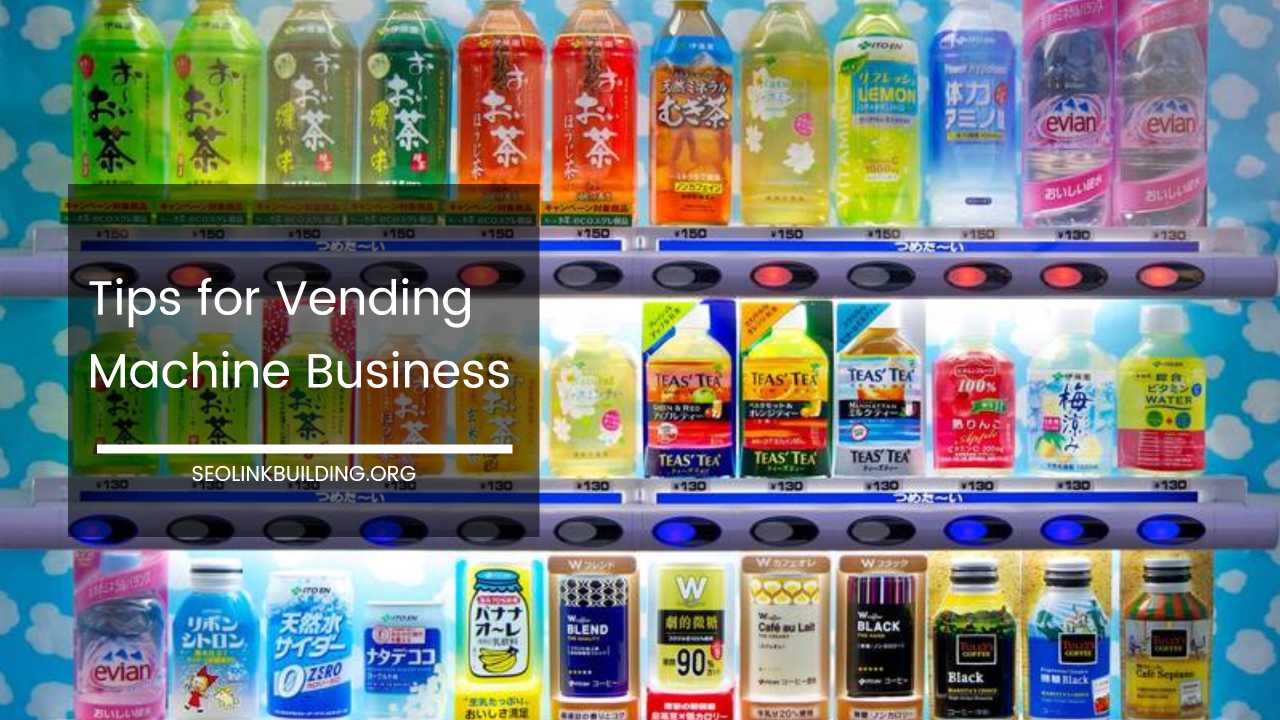Tips for Vending Machine Business

Vending Machine Business: Your Guide to Success
The vending machine business offers a unique opportunity to blend passive income with the satisfaction of building your own venture.
This comprehensive guide equips you with the knowledge to navigate every stage of your vending machine business journey, from market research to long-term growth strategies.
Market Research: Understanding Your Niche
Before investing in machines and inventory, a thorough market research phase is crucial. This step lays the foundation for your business strategy by identifying potential customers, their needs, and buying habits. Here’s what to delve into:
-
Location Analysis : Go beyond simply identifying high-traffic areas. Consider demographics, existing competition, and the overall “feel” of a location. Here are some key questions to ask yourself:
- Demographics: Does the target location have a predominantly young workforce, families with children, or health-conscious individuals? Tailor your product selection to their preferences.
- Existing Competition: What vending machines are already present? Are there any gaps in their offerings that you can capitalize on? For example, if they only offer sugary drinks, consider including a selection of bottled water and healthy beverages.
- Foot Traffic Patterns: Understand the flow of people throughout the day and week. Lunchtime crowds in office buildings will have different needs than late-night shift workers in factories.
- Accessibility and Visibility: Ensure your machines are placed in well-lit, easily accessible locations with high visibility. Consider factors like proximity to elevators, break rooms, or waiting areas.
-
Customer Needs and Preferences : Understanding your target customer’s needs is paramount. Research current trends in health and wellness, dietary restrictions, and popular snack choices. Here are some additional considerations:
- Health Trends: The demand for healthy snacks and beverages is on the rise. Stock your machines with options like nuts, fruit bars, and sugar-free drinks to cater to this growing segment.
- Dietary Restrictions: Consider offering gluten-free, vegan, or allergy-friendly options to cater to a wider customer base.
- Local Preferences: Research popular local snacks and beverages. Including these can build customer loyalty and establish your brand as being in touch with the community.
-
Regulatory Requirements : Research vending machine regulations in your area. These may cover permits, licenses, health inspections, and product labeling requirements. Here are some resources to get you started:
- Small Business Administration (SBA): https://www.sba.gov/ offers guidance on starting and running a business, including information on permits and licenses.
- National Automatic Merchandising Association (NAMA): https://namanow.org/convenience-services/vending/ provides resources and information specific to the vending machine industry, including regulatory compliance.
Choosing the Right Vending Machine
The vending machine market offers a diverse selection, from classic snack and drink dispensers to high-tech marvels. Here are the key factors to consider when making your choices:
- Machine Type
- Snack and Beverage Machines: These are the most common type, dispensing pre-packaged food and drinks in various configurations. Consider capacity, size, and features like refrigerated compartments for beverages.
- Bulk Vending Machines: These dispense items like candy or gumballs by weight or quantity. Ideal for high-traffic locations or impulse purchases.
- Specialty Vending Machines: These cater to specific niches, vending everything from personal hygiene products to hot meals or over-the-counter medications (in permitted locations). Consider the potential market demand and profit margins for these specialized options.
- Capacity and Size : Consider the volume of products you want to stock and the available space at your locations. Smaller, countertop machines might be suitable for limited spaces, while larger floor models offer greater capacity for high-traffic areas.
- Features : Opt for features that suit your needs and budget. Telemetry allows remote monitoring of inventory and sales data, while cashless payment systems cater to modern preferences. Consider features like energy efficiency and easy-to-clean designs for long-term cost savings.
Beyond New vs. Used: Exploring Machine Acquisition Options
The traditional debate of new vs. used machines goes beyond a simple cost comparison. Here’s a breakdown of the various acquisition options to consider:
- New Machines:
- Advantages: New machines come with warranties, offer better energy efficiency, and often have more advanced features. They also project a professional image for your business.
- Disadvantages: Higher initial investment compared to used machines.
-
Used Machines:
- Advantages: More budget-friendly option, allowing you to scale your business faster with a lower upfront cost.
- Disadvantages: May require more frequent maintenance and repairs. Potential for outdated features and lower energy efficiency. Thoroughly inspect used machines before purchase to identify any potential issues.
-
Leasing:
- Advantages: Spreads out the cost of acquiring machines over time, requiring less upfront capital. Can be a good option if you’re unsure about the long-term viability of a particular location.
- Disadvantages: Leasing typically costs more in the long run compared to buying. You won’t own the machines at the end of the lease term.
-
Renting:
- Advantages: Offers maximum flexibility for short-term events or testing the viability of a new location.
- Disadvantages: Renting is typically the most expensive option per use. Not suitable for long-term vending machine placements.
Securing Prime Locations: Building Strong Partnerships
Location is the cornerstone of a successful vending machine business. Here are some strategies for securing prime placements and building strong partnerships with location owners:
- Network and Build Relationships: Connect with property owners and managers of buildings in your target areas. Attend industry events and join networking groups to build connections. Present a clear and professional proposal outlining your offerings, commission structure, and the benefits you bring to their location.
- Offer Competitive Commissions: Negotiate a fair commission split with the location owner. Consider factors like foot traffic, the value your machines bring to their space, and the overall profitability of the location.
- Highlight Added Value: Go beyond just selling snacks and drinks. Offer complementary services like cleaning, machine maintenance, and keeping areas around your machines free of clutter. This demonstrates professionalism and adds value to your partnership.
- Maintain Open Communication: Regularly communicate with location owners regarding sales performance, machine maintenance needs, and any customer feedback. Transparency and open communication build trust and foster long-term partnerships.
Stocking Your Machines for Profit
Choosing the right products directly impacts your sales and profitability. Here are key considerations for a well-stocked vending machine:
- Product Variety : Offer a mix of popular items and cater to specific needs. This might include healthy snacks, beverages, indulgent options, and sugar-free alternatives. Consider seasonal variations, including hot beverages and winter snacks in colder months and refreshing drinks and ice cream during the summer. Stay updated on current trends and adapt your offerings accordingly.
- Profit Margins : Calculate the cost per item and choose products that offer a healthy profit margin. Consider offering bundled deals or combo options to increase sales and perceived value.
- Freshness and Quality : Maintain fresh inventory by regularly restocking popular items and promptly rotating older stock. Focus on quality products to build customer trust and loyalty.
- Data-Driven Stocking: As your business grows, leverage sales data to optimize your inventory management. Identify high-performing and low-performing products in each location. Adjust your offerings based on this data to maximize profitability.
Maintaining and Servicing Your Machines: Ensuring Smooth Operations
Regular maintenance is crucial for a smooth-running vending machine business. Here are key practices to ensure optimal performance:
- Develop a Maintenance Schedule : Establish a routine for cleaning and restocking machines. Inspect for malfunctions and address them promptly. Consider factors like daily visual inspections, weekly cleaning, and monthly maintenance checks.
- Invest in Preventative Maintenance : Schedule periodic checkups with a qualified vending machine technician to identify and address potential problems before they cause disruptions. This can minimize downtime and costly repairs.
- Maintain a Well-Stocked Parts Inventory : Keep essential spare parts readily available to minimize downtime during repairs. This proactive approach ensures you can address issues quickly and efficiently.
- Utilize Technology: Consider implementing remote monitoring systems to track machine performance in real-time. This allows you to identify potential issues early on and take preventative measures.
Building a Loyal Customer Base: The Power of Positive Experiences
Loyal customers are the lifeblood of your vending machine business. Here are some strategies to cultivate a positive customer experience and build lasting relationships:
- Machine Upkeep and Cleanliness : Maintain clean and visually appealing machines. This builds trust and encourages repeat purchases. Regularly wipe down dispensers, address spills promptly, and keep the surrounding area free of clutter.
- Product Availability : Ensure your machines are well-stocked with popular items to avoid customer frustration. Implement clear inventory management practices to minimize stockouts and maintain product availability.
- Competitive Pricing : Price your products competitively to attract customers and generate healthy profits. Conduct competitor analysis and price your offerings slightly lower or offer value-added options like bundled deals to stand out.
- Consider Cashless Payment Options : Offer contactless payment options like credit cards, debit cards, and mobile wallets to cater to modern preferences. This convenience can increase customer satisfaction and potentially boost sales.
Expanding Your Vending Machine Business: Strategies for Growth
Once your business is established and operating smoothly, consider these strategies to expand your reach and increase profitability:
- Diversify Your Machine Portfolio : Explore specialty vending machines that cater to specific niches. This could include machines dispensing office supplies, personal hygiene products, over-the-counter medications (in permitted locations), or even fresh food options. Partner with local businesses to offer branded vending machines with their products, creating a revenue-sharing opportunity.
- Expand Your Geographic Reach : Identify new high-traffic locations with demographics that align with your product offerings. Secure placements in additional buildings, offices, or transportation hubs to increase your customer base.
- Embrace Technology : Utilize technology to streamline operations and improve customer experience. Consider route optimization software for efficient restocking, telemetry for remote machine monitoring, and digital signage for targeted advertising on vending machines.
Optimizing Your Operations for Efficiency: Maximizing Profits
As your business grows, focus on optimizing your operations to maximize profit margins and minimize wasted resources:
- Route Planning : Design efficient routes for restocking and servicing machines. Utilize technology like GPS tracking to optimize travel time, fuel consumption, and ensure efficient use of your resources.
- Inventory Management : Implement inventory management software to track sales data and optimize stock levels. This helps prevent overstocking and ensures you have the right products available at the right time in each location. Analyze sales data to identify trends and adjust your inventory accordingly.
- Data-Driven Decisions : Leverage sales data to make informed business decisions. Identify high-performing and low-performing products and locations. Use this data to adjust your offerings, pricing strategies, and machine placements for better results.
Financial Considerations and Legal Compliance: Building a Secure Business
- Business Formation : Choose the appropriate business structure for your vending machine business (sole proprietorship, partnership, LLC, etc.). This impacts taxes, liability, and operations. Consult with a legal professional to determine the best structure for your specific needs.
- Business Insurance : Obtain adequate insurance coverage to protect your business from potential liabilities like product malfunctions or customer injuries. Consider general liability insurance and product liability insurance.
- Accounting and Taxes : Maintain accurate financial records and comply with all tax filing requirements. Consider hiring a qualified accountant to streamline this process and ensure you are meeting all tax obligations.
The Future of Vending: Embracing Trends for Long-Term Success
The vending machine industry is constantly evolving. Here are some trends to keep an eye on and integrate into your business strategy for long-term success:
- Cashless Payments: The integration of cashless payment options like mobile wallets and contactless payments is becoming increasingly popular. Ensure your machines offer these convenient payment methods to cater to a wider customer base.
- Healthy Vending: There’s a growing demand for healthy and convenient food options. Stock your machines with nutritious snacks, fresh fruit, and sugar-free beverages to cater to this growing segment. Partner with local health food stores or organic brands to offer unique and healthy vending machine options.
- Connected Vending Machines: Telemetry allows remote monitoring of inventory, sales data, and machine performance. This enables real-time adjustments, preventative maintenance, and data-driven decision making for optimal performance.
- Interactive Vending Machines: Touchscreen interfaces and interactive displays can enhance the customer experience. Allow for product customization, targeted advertising based on demographics, and integration with loyalty programs to build customer engagement.
By understanding these trends and adapting your approach, you can position your vending machine business for long-term success in the ever-evolving marketplace.
Final Word
The vending machine business offers a promising path to entrepreneurial success. With a well-defined strategy, careful planning, ongoing optimization, and an embrace of new technologies, you can turn a network of machines into a reliable source of income.
Remember, success requires a customer-centric approach, a commitment to quality and convenience, and the ability to adapt to the ever-evolving landscape of the vending industry.
This comprehensive guide has equipped you with the knowledge to navigate the various stages of your vending machine business journey. Here are some additional tips to consider as you embark on your entrepreneurial adventure:
- Develop a Strong Brand Identity: Create a recognizable logo and brand message that reflects your commitment to quality and customer satisfaction. Consider branding your vending machines for a professional image.
- Focus on Sustainability: Implement eco-friendly practices whenever possible. Use recyclable or compostable packaging for snacks and beverages. Explore energy-efficient vending machines to minimize your environmental footprint.
- Customer Service Matters: While vending machines offer a degree of passive income, don’t neglect customer service. Respond promptly to customer inquiries and complaints. Consider offering a toll-free number or online feedback form for easy communication.
- Stay Informed and Network: Attend industry trade shows, conferences, and workshops to stay updated on the latest trends and technologies. Network with other vending machine operators to share best practices and learn from their experiences.
By following these guidelines and fostering a spirit of continuous improvement, you can transform your vending machine business into a thriving venture that caters to the needs of your customers and delivers long-term success.
Remember, the vending machine industry offers a unique blend of entrepreneurial freedom and the satisfaction of building a business that provides convenient access to products and services for your community.
With dedication, perseverance, and a commitment to excellence, you can turn your vending machine venture into a source of pride and a profitable enterprise.













